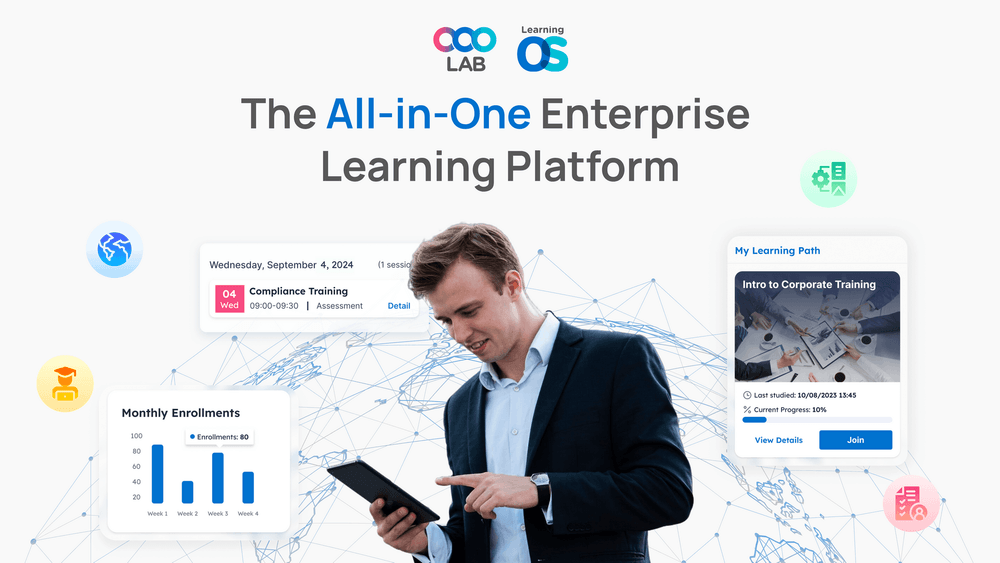

The sales landscape is shifting faster than ever, with AI, buyer expectations, and global dynamics demanding agile, skilled teams. As we approach 2026, sales training must evolve to keep pace, focusing on personalization, technology integration, and human-centric development. This means moving beyond rote learning to immersive, data-driven experiences that build resilience and innovation in sales reps.
In a world where 74% of sales leaders prioritize upskilling for AI adoption, according to a 2025 Gartner report, sales training becomes a strategic imperative. It not only boosts quotas but also enhances retention and morale. This blog uncovers the top sales training trends for 2026, drawing on expert insights to help leaders prepare their teams. From AI-powered coaching to microlearning bursts, discover how these shifts will redefine sales training and drive revenue growth.

Personalization is no longer a buzzword—it's the backbone of effective sales training. In 2026, AI will tailor programs to individual rep needs, analyzing performance data to recommend modules on negotiation or objection handling.
AI tools will forecast skill gaps using CRM data and sales metrics, creating dynamic paths. A rep struggling with upsell techniques might get instant micro-modules, boosting close rates by 22%, as per a 2025 McKinsey study on personalized L&D. This proactive approach ensures sales training aligns with real-time business needs, reducing ramp-up time for new hires.
Imagine an AI coach reviewing call recordings and suggesting real-time tweaks, like better empathy phrasing. Platforms will integrate these into sales training, offering 24/7 feedback. A 2025 Deloitte report highlights that AI coaching lifts sales performance by 25%, making it essential for distributed teams.
As AI permeates sales training, ethical guidelines will emerge to combat bias. Training will include modules on transparent AI use, ensuring reps trust the tools. This trend fosters inclusive sales training, where diverse teams thrive without algorithmic pitfalls.
>>> Read more: Sales Training Demystified: Why It Matters More Than Ever
>>> Read more: Effective Onboarding Strategies for New Sales Hires: Setting Them Up for Success
Hands-on experiences outpace lectures, and 2026 will see sales training embrace VR and AR for realistic simulations. Reps will "walk through" client negotiations in virtual boardrooms, building muscle memory without real-world risks.
VR will simulate high-stakes pitches, allowing reps to practice with AI avatars mimicking tough buyers. A 2025 Forrester forecast predicts VR adoption in sales training will grow 40%, enhancing retention by 60% through immersive recall. For global teams, this democratizes access to live coaching.
Augmented reality overlays will let reps "demo" products in AR during sales training, bridging virtual and hybrid gaps. Imagine overlaying software interfaces on physical prototypes—perfect for tech sales. This trend, per a 2025 eLearning Industry survey, will cut demo prep time by 30%.
Combining VR with in-person elements, sales training will create hybrid simulations. Post-session debriefs via collaborative tools will reinforce learning, fostering team bonds. As hybrid work persists, this versatility ensures sales training remains engaging across formats.
Book Free Demo with us. Bring your Training and Learning to a new height with LearningOS.

>>> Read more: Building Confidence in Your Sales Team Through Training and Development
>>> Read more: Addressing declining retail foot traffic issue
Attention spans are shrinking, so sales training in 2026 will favor bite-sized, on-demand content. Microlearning—5-10 minute modules—delivers quick wins, fitting into reps' packed days.
With reps always connected, sales training will go fully mobile, pushing notifications for timely tips like "Refresh your cold email script.”. Mobile apps will enable offline access, so reps can review modules during travel or downtime. This accessibility ensures learning happens in the moment, reinforcing habits like personalized outreach or follow-up strategies. For global teams, multilingual support in mobile sales training will further enhance inclusivity, allowing reps in different time zones to engage at their convenience.
Integrated with CRMs, sales training will trigger modules based on deal stages—e.g., a negotiation refresher before a big pitch. Imagine a rep receiving a prompt in their CRM: "Deal at proposal stage—review value prop tips." This integration turns data into action, helping reps apply lessons directly to open opportunities. In 2026, as CRMs become more AI-savvy, these triggers will evolve to predict needs, preempting challenges before they arise and elevating sales training from reactive to proactive.
Focus on "power skills" like empathy and agility via short videos or quizzes. In 2026, sales training will prioritize these over rote product knowledge, as buyers value human connection. These modules could include quick empathy exercises, like role-playing buyer pain points, or agility drills on adapting to market shifts. By breaking power skills into digestible pieces, reps can build them incrementally, leading to more authentic interactions and stronger relationships. This emphasis on soft skills complements technical training, creating well-rounded professionals ready for complex sales scenarios.
>>> Read more: A guide to teaching sales rep positive response
>>> Read more: Why is employee upskilling non-negotiable for business success
In 2026, sales training will be fueled by analytics, turning data into actionable insights for continuous improvement.
LMS platforms will track sales training ROI via metrics like quota attainment post-module. Dashboards will correlate training with revenue, helping leaders justify budgets. These dashboards could visualize trends, like how a negotiation module correlates with a 10% uplift in deal size. Real-time tracking enables quick adjustments, such as boosting underperforming modules, making sales training a nimble tool for business alignment.
Analytics will predict team skill needs based on market trends, preempting gaps. For instance, if AI sales tools rise, sales training auto-suggests upskilling paths. Predictive models might analyze industry data alongside internal metrics to forecast needs like cybersecurity knowledge for sales in tech. This foresight reduces reactive training, allowing organizations to stay ahead of competitors and adapt to emerging buyer preferences.
Post-training surveys and AI sentiment analysis will refine content iteratively. Sales training will evolve weekly, ensuring relevance. These loops could incorporate rep feedback via quick polls, using AI to synthesize insights and update modules automatically. For example, if feedback shows a module is too lengthy, it could be broken into micro segments. This iterative process keeps sales training fresh, fostering a culture of continuous improvement and higher adoption rates.
Sales training in 2026 will leverage community, turning solo learning into shared growth.
Platforms will match reps for shadow sessions or forums, accelerating knowledge transfer. These networks could pair veterans with newcomers for virtual mentorship, sharing real-world tips on closing deals. This peer-driven sales training builds relationships, reducing isolation in remote setups and fostering a supportive culture.
Team-based simulations will blend sales with marketing, fostering alignment. Challenges might involve joint role-plays, where sales and marketing co-create pitches, leading to better lead quality and faster conversions. In 2026, as interdepartmental collaboration grows, this trend will streamline processes and boost overall revenue.
For multinational teams, sales training will use multilingual forums and live Q&As. This inclusivity, vital in hybrid setups, enhances cultural competence. Reps from different regions could share localization strategies, enriching the collective knowledge base.
2026's sales training trends—AI personalization, immersive tech, microlearning, analytics, power skills, collaboration, and ethics—promise a renaissance in sales development. These shifts will not only meet quotas but cultivate resilient, empathetic teams ready for tomorrow's challenges.
Leaders who invest in forward-thinking sales training will lead the pack, turning trends into triumphs. Start adapting now: Your sales future depends on it.
At OOOLAB (pronounced 'uːlæb'), our mission is to make complex learning operations simple. We aim to positively impact the lives of over 1,000,000 learners and educators by the end of 2026.
OOOLAB's LearningOS provides educational institutions and corporate enterprises with an all-in-one solution to create and deliver engaging learning experiences.
We meet organizations' needs or support your growth. We provide undivided attention. We provide:
1. Dedicated success manager: We offer direct communication with a real human who'll discuss your enterprises unique learning operations and goals.
2. Personalized setup: Our team will help you transition to LearningOS on your schedule, one step at a time.
3. Around the clock support: Get help from us any time, and in any time zone.
We have recently launched a new AI training tool, Skill Quotient OS, designed to elevate hybrid training to new heights. It offers role-play exercises with scenarios and assessments.This tool can apply in sales training, corporate development and customer support training in any industry.
Reach out to us at: LinkedIn, Facebook, Instagram, Tiktok, X
1. What are the main benefits of LearningOS?
LearningOS streamlines enterprise training by automating onboarding, compliance tracking, and performance analytics, encouraging sales teams to focus on revenue-driving activities. It boosts engagement with mobile-accessible modules and gamified rewards, leading to faster skill acquisition in corporate environments.
2. What main features does LearningOS offer?
Our all-in-one platform integrates a Content Management System for easy course creation, a robust Learning Management System for sales training delivery, advanced authoring tools like H5P for interactive content, and a mobile-friendly Learner Portal for on-the-go access.
3. Can your platform be used for corporate enterprises?
Absolutely! LearningOS is an Enterprise LMS that is a great fit for corporate learning. In fact, we have clients with up to 700,000 employees using LearningOS! Upskill your workforce by creating and assigning interactive eLearning content while effortlessly tracking employee progress.
4. Who currently uses your platform?
LearningOS is a trusted enterprise LMS adopted by a diverse range of global organizations, empowering over 3,000 instructors and 250,000 learners across 23 countries.
5. What types of content options are available on your platform?
You can access ready-to-use curriculums for sales training, including modules on consultative selling and CRM mastery, tailored to your enterprise needs. Additionally, you can request custom courses designed specifically for your teams, such as compliance training for financial staff or product demo modules for sales reps, ensuring content aligns perfectly with your business goals.
6. What is unique about LearningOS?
You’ll experience an enterprise LMS that seamlessly blends interactive courses, gamified learning, and personalized training paths to engage your learners and accelerate skill growth. With Skill Quotient AI, you can leverage advanced algorithms to streamline course creation, automating content design to save you time and deliver tailored, high-impact training. This empowers you to rapidly deploy relevant content, fostering a dynamic, future-ready workforce across your global operations.
7. How can I get started?
You can begin by scheduling a free consultation to assess your enterprise’s sales training needs. During the demo, you’ll explore personalized features like CRM-integrated pathways and analytics dashboards, followed by a quick setup tailored to your organization’s scale, ensuring you’re ready to transform your workforce efficiently.